
Ager-Revista de Estudios sobre Despoblacion y Desarrollo Rural
Scope & Guideline
Bridging Research and Rural Transformation
Introduction
Aims and Scopes
- Rural Development and Policy Evaluation:
The journal examines various rural development programs and policies, assessing their effectiveness and impact on local communities. This includes studies on program evaluations in different geographical contexts, such as Spain and Colombia. - Depopulation Dynamics:
A significant focus is placed on the phenomenon of depopulation in rural areas, analyzing its causes, consequences, and projections. The journal publishes research on demographic trends, including aging populations, migration patterns, and local government responses. - Social Inclusion and Community Engagement:
Research in this area highlights the importance of social inclusion within rural communities, particularly regarding marginalized groups. It explores participatory approaches to community development and the role of citizen engagement in shaping rural policies. - Cultural and Heritage Conservation:
The journal addresses the importance of cultural heritage in rural areas, examining how heritage resources can be revalued and utilized for sustainable development. Studies often focus on local traditions, landscapes, and their socio-economic implications. - Environmental Sustainability and Innovation:
Research also delves into sustainable practices in agriculture and rural tourism, emphasizing the need for innovative approaches to environmental management and community resilience.
Trending and Emerging
- Impact of Digitalization on Rural Areas:
There is a growing focus on how digital technologies influence rural development, including remote work, digital entrepreneurship, and access to services. This is particularly relevant in the context of the COVID-19 pandemic. - Multiculturalism and Coexistence in Rural Spaces:
Emerging studies are increasingly addressing the challenges and opportunities of multiculturalism in rural settings, exploring how diverse populations can coexist and contribute to rural revitalization. - Gender Perspectives in Rural Development:
An uptick in research that analyzes gender dynamics in rural contexts, including women's roles in agriculture and entrepreneurship, reflects a broader trend towards inclusivity and social equity in rural studies. - Sustainable Tourism as a Development Strategy:
There is a notable increase in research on rural tourism, particularly how it can be leveraged as a strategy to combat depopulation and enhance local economies through regenerative practices. - Climate Change and Environmental Resilience:
The journal is increasingly addressing the implications of climate change for rural areas, focusing on adaptation strategies and the sustainability of rural livelihoods.
Declining or Waning
- Traditional Agricultural Practices:
There appears to be a waning focus on traditional agricultural practices and their socio-economic impact as newer themes like digitalization and innovation in rural development gain traction. - Historical Analysis of Rural Communities:
While historical analyses have been significant in understanding rural transitions, the prevalence of such studies has decreased, possibly overshadowed by more contemporary issues like migration and depopulation. - Urban-Rural Linkages:
Research examining the connections and interactions between urban and rural areas has become less frequent, as the journal pivots more towards localized rural issues and the specific challenges of depopulation.
Similar Journals
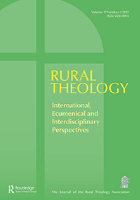
Rural Theology-International Ecumencial and Interdisciplinary Perspectives
Bridging Faith and Community in Rural ContextsRural Theology: International Ecumenical and Interdisciplinary Perspectives is a pivotal journal published by Routledge Journals, Taylor & Francis Ltd, dedicated to the exploration and discourse surrounding the interplay of theology in rural contexts. With an impressive Q1 ranking in Religious Studies and a substantial Scopus rank of #49 out of 644, the journal stands as a leading platform for innovative research and scholarly dialogue. It encompasses a diverse range of perspectives, encouraging interdisciplinary collaboration and contributing to the vibrant field of rural theology, particularly within ecumenical frameworks. Although Access options are currently not designated as Open Access, the journal remains indispensable for researchers, practitioners, and students keen on analyzing the theological dimensions of rural life. Since its inception in 2014, Rural Theology has committed to elucidating the unique challenges and opportunities that rural communities face, making it essential reading for anyone invested in this vital area of study.

RIVAR-Revista Iberoamericana de Viticultura Agroindustria y Ruralidad
Exploring the intersection of culture, history, and viticulture.RIVAR-Revista Iberoamericana de Viticultura Agroindustria y Ruralidad, published by the prestigious University of Santiago de Chile, serves as a vital platform for interdisciplinary dialogue in the fields of viticulture, agroindustry, and rural studies. With its Open Access model implemented since 2014, the journal ensures wide dissemination of research findings, promoting accessibility and engagement within the scholarly community. RIVAR is recognized for its distinctive contribution to various disciplines, featuring a 2023 categorization that includes Q2 in Cultural Studies and Q1 in History, reflecting its impact and relevance across a spectrum of academic areas. With a commitment to publishing high-quality research that addresses critical challenges and advancements in viticulture and rural development, the journal aims to facilitate innovative solutions and foster collaborations among researchers, industry professionals, and students. Its rankings in multiple categories underscore its role as an influential resource for contemporary academic inquiry in Latin America and beyond.

Chinese Journal of Population Resources and Environment
Bridging Demography and Environmental Science for a Sustainable FutureChinese Journal of Population Resources and Environment is an esteemed interdisciplinary journal published by KEAI PUBLISHING LTD, focusing on the critical intersections of population dynamics, resource management, and environmental sustainability. With an E-ISSN of 2325-4262 and an ISSN of 2096-9589, this Open Access journal has been committed to disseminating high-quality research since its inception in 1992 and has embraced Open Access since 2020. As part of its robust reputation, the journal ranks in the Q1 category for Demography and is recognized in the Q2 tiers for both Environmental Science and Toxicology, reflecting its significant contribution to these fields. The 2023 Scopus rankings highlight its competitiveness, with an impressive percentile of 84th in Demography and 67th in Environmental Science (miscellaneous). Hosted from Beijing, China, the journal serves as a vital platform for researchers, professionals, and students to engage with cutting-edge studies that address pressing global challenges related to population and environmental resources.
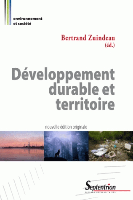
Developpement Durable & Territoires
Navigating Challenges in Environmental and Territorial ManagementDéveloppement Durable & Territoires is a premier open-access journal dedicated to fostering innovative research and discourse in the fields of sustainable development and territorial studies. Published by the RESEAU DEVELOPPEMENT DURABLE & TERRITOIRES FRAGILES, this journal serves as a vital platform for researchers, practitioners, and policymakers seeking to address the complex challenges posed by environmental sustainability and territorial management. Since its inception in 2002, it has committed to disseminating high-quality research that informs best practices and encourages interdisciplinary collaboration across various sectors. While it currently lacks a quantified impact factor and HIndex, its accessibility ensures a wide reach and engagement with contemporary thought leadership in sustainability. The journal is based in Villeneuve d'Ascq, France, and provides an essential resource for advancing knowledge in sustainable practices and insights into fragile territories.

Revista Brasileira de Educacao do Campo-Brazilian Journal of Rural Education
Enhancing educational practices for a brighter rural future.Revista Brasileira de Educação do Campo - Brazilian Journal of Rural Education, published by Universidade Federal de Tocantins (UFT) since 2016, is a distinguished open access journal aimed at advancing research and scholarship in the field of rural education. With its commitment to enhancing educational practices and policies in rural settings, this journal serves as a vital platform for researchers, educators, and policymakers to share their findings and innovations. By embracing a diverse range of interdisciplinary perspectives, the journal seeks to address the unique challenges and opportunities faced by rural educators in Brazil and beyond. The journal's dedication to open access ensures that the knowledge produced is widely disseminated, fostering a rich dialogue within the educational community. As the field of education continues to evolve, Revista Brasileira de Educação do Campo stands at the forefront, championing the importance of equitable and inclusive education for all learners.

Regional Statistics
Bridging Disciplines for Informed Policy MakingRegional Statistics, published by the Hungarian Central Statistical Office, is a leading scholarly journal that plays a pivotal role in enhancing the understanding of regional development and statistical analysis. With its ISSN 2063-9538 and E-ISSN 2064-8243, this open-access journal contributes significantly to various fields, including Cultural Studies, Economics, Geography, and Public Administration. The journal has established itself with impressive Scopus rankings, placing it in the top percentiles across multiple categories, evidencing its high-quality research outputs. Covering converged years from 2015 to 2024, Regional Statistics publishes insightful articles that address pressing regional issues, making it an invaluable resource for researchers, professionals, and students alike who are interested in the quantitative dimensions of society. With a reputation bolstered by its Q1 and Q2 categorizations in various disciplines, this journal is not only committed to advancing statistical knowledge but also to fostering interdisciplinary dialogue among statisticians, policymakers, and social scientists.
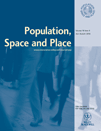
Population Space and Place
Unraveling the Complexities of Population TrendsPopulation Space and Place is an esteemed academic journal published by WILEY, dedicated to advancing the fields of demography and geography, planning, and development. With an impressive 2023 impact factor and categorized in the top quartile (Q1) for both demography and geography, this journal serves as a vital platform for researchers, professionals, and students seeking to explore the spatial dimensions of population dynamics. Founded in 2004 and running through 2024, it has established itself as a significant contributor to scholarly discussions, evidenced by its high Scopus rankings, including rank #18 out of 139 in demography and #165 out of 821 in geography and planning. While the journal currently does not offer open access, it remains a key resource for those involved in academic research and policy formulation. With its focus on the interplay between population trends and spatial analytics, Population Space and Place is essential for anyone aiming to understand the complexities of population geography in a rapidly changing world.
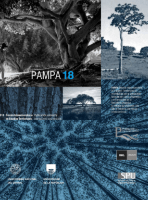
Pampa
Advancing Knowledge: Unveiling the Rich Tapestry of the Pampas Region.Pampa is a distinguished academic journal dedicated to the exploration and dissemination of research across various disciplines, with a special focus on regional studies and environmental issues prevalent in the Pampas region of Argentina. Published by EDICIONES UNL, this open access journal has been providing researchers, professionals, and students with vital insights and current developments in the field since its inception in 2005. With its ISSN 1669-3299 and E-ISSN 2314-0208, Pampa prioritizes accessibility and visibility, ensuring that scholarly work is freely available to a global audience. Researchers are encouraged to submit their findings and contribute to the ongoing dialogue within this vibrant and critical area of study. By promoting open access to significant research, Pampa enhances collaborative efforts and fosters innovation within the academic community.
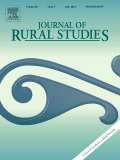
Journal of Rural Studies
Shaping the Future of Rural StudiesWelcome to the Journal of Rural Studies, a premier peer-reviewed publication dedicated to advancing the field of rural research. Published by PERGAMON-ELSEVIER SCIENCE LTD, this esteemed journal has been a cornerstone of scholarly discourse since its inception in 1985 and continues to evolve through 2024. With an impressive impact factor and categorization in the Q1 tier across various fields, including Development, Forestry, Geography, Planning and Development, and Sociology and Political Science, the journal is among the elite voices in rural studies. Researchers, professionals, and students alike will find invaluable insights within its pages, supported by rigorous empirical research and theoretical explorations that address the complexities of rural life and its myriad challenges. While it currently does not offer open access, the subscription model ensures a broad dissemination of knowledge, fostering collaboration and innovation within the academic community. With a robust Scopus ranking that places it in the top percentiles across multiple social sciences, the Journal of Rural Studies remains an essential resource for those dedicated to understanding and improving rural environments worldwide.

Management Theory and Studies for Rural Business and Infrastructure Development
Connecting Ideas to Action for Sustainable Rural Futures.Management Theory and Studies for Rural Business and Infrastructure Development is an esteemed open-access journal published by Vytautas Magnus University, dedicated to advancing knowledge in the fields of rural business management and infrastructure development. With the ISSN 1822-6760 and E-ISSN 2345-0355, this journal serves as a crucial platform for researchers, professionals, and students interested in the dynamics of rural economic growth and sustainable practices. Since its establishment in 2006, it has championed the dissemination of innovative research and best practices, offering a unique opportunity to explore pressing issues affecting rural development. The journal aims to foster collaboration and pivotal discussions that can lead to impactful policies and strategies within the sector. By providing open access to all published articles, it ensures that valuable insights are readily available to a global audience, enhancing the overall impact of research in rural business and infrastructure development.